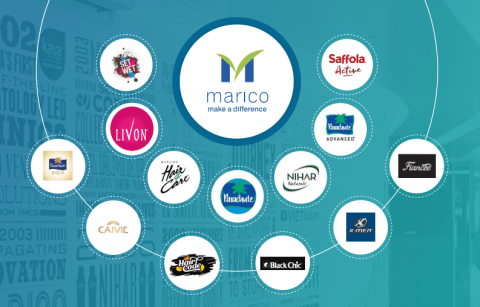Marico Share Price Could Decline after Sell Call by BOB Capital Markets
BOB Capital Markets has released a research report dated September 26, 2024, with SELL CALL for Marico Limited with a target price of Rs 532, implying a potential downside of 23% from its current price of Rs 694. The rating is based on several factors, primarily driven by concerns around cash repatriation risks from Marico’s Bangladesh subsidiary amid the ongoing foreign exchange crisis in the country.
Despite Marico's strong fundamentals and projected growth in revenue, BOB Capital Markets emphasizes the risks associated with foreign subsidiary cash flows, particularly in the current FX environment. These risks contribute significantly to the negative sentiment surrounding the stock. While the stock has shown resilience, reaching a 52-week high of Rs 711, the report advises caution, forecasting near-term challenges that could impact the company's financial health.
Marico Limited, a key player in the consumer staples sector, faces significant headwinds as repatriation risks from its Bangladesh subsidiary weigh on the stock outlook. The company recently recorded a substantial dividend payout from Marico Bangladesh, but cash repatriation issues persist due to the ongoing foreign exchange crisis in Bangladesh. Despite strong revenue projections and rural recovery, the company’s stock is rated a sell by analysts, driven by the risks tied to foreign cash flows and volatility in sales performance. Below is a detailed analysis of the report’s findings, including critical levels for investors.
Cash Repatriation Risk from Bangladesh
Marico's ability to repatriate cash from its Bangladesh subsidiary remains a key concern.
Marico Bangladesh recently declared a BDT100 dividend per share, equating to about 30% of its cash on hand. However, persistent foreign exchange (FX) challenges in Bangladesh, combined with delayed remittances, cast a shadow over Marico’s consolidated cash flow. The company has seen a lag of around 30 days between dividend record and payment dates, escalating to 105 days for the FY24 final dividend, which highlights the increasing difficulty of cash repatriation. These FX risks directly impact Marico’s liquidity, contributing to the negative outlook on the stock.
Revenue Outlook and Financial Targets
Marico's revenue growth projections remain robust, but challenges persist.
For FY25, the company expects revenue to reach Rs 107,206 million, a notable increase from Rs 96,530 million in FY24. EBITDA is forecasted to grow to Rs 22,548 million, representing an 11.3% year-on-year increase. The stock currently trades at an adjusted P/E ratio of 55.3x for FY25, reflecting the market’s cautious sentiment despite growth prospects. However, Marico’s reliance on Bangladesh for 22% of its EBITDA makes these targets vulnerable to macroeconomic risks in that region.
Rural Recovery Boost
Marico is positioned to benefit from rural market recovery.
With considerable exposure to rural India, particularly in the mass-end hair oil segment, Marico is expected to see demand revival in FY25. Rural recovery, driven by improved economic conditions and the return of consumption in essential categories, could uplift Marico’s sales mix and margins. The company’s value-added hair oil product line is likely to benefit the most, providing a cushion against the broader market volatility.
Stock Levels and Target Price
Stock downgraded with a target price of Rs 532.
Marico's stock is currently trading at Rs 694 as of September 26, 2024, with a 52-week high of Rs 711. Analysts have revised the target price to Rs 532, reflecting a potential downside of 23%. The stock has been given a “Sell” rating due to the risks associated with Bangladesh's FX crisis and the uncertainties surrounding the company’s ability to smoothly repatriate earnings from its subsidiary. Investors should closely monitor the stock for further developments in the repatriation risks and rural recovery trends.
Investment Implications
Marico's near-term challenges call for cautious investor positioning.
While Marico has strong growth fundamentals, the risks posed by its reliance on foreign subsidiaries and exposure to volatile rural markets weigh heavily on its stock performance. Long-term investors might look for clarity on cash repatriation mechanisms and stabilization in Bangladesh’s FX reserves before increasing their holdings. The stock may also appeal to those focused on dividend yield, but with a conservative outlook on capital appreciation in the near term.
In conclusion, while Marico remains a strong player in consumer staples with promising rural recovery potential, the stock faces significant headwinds from international cash flow risks. Investors should maintain a cautious stance, with a focus on monitoring FX developments and the company's ability to meet its repatriation commitments.
